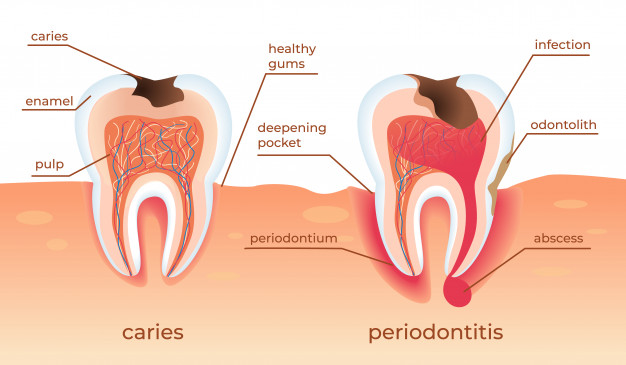

Root canal treatments are one of those nightmares often feared the most. Going to the dentist can be scary, but root canal treatments are particularly frightening. Most people are victims to dental phobia even with the thought of root canals, isn’t it? Due to this, people delay dental treatments, which means they end up in a deeper fix. This is not only bad for their teeth but also for their pocket.
Some people are victims of tooth cavities, no matter how much they take care of their oral hygiene. Relatable isn’t it? This is because their teeth are cavity-prone. Cavity-prone people can benefit from pit and fissure sealants in a way they can even avoid root canal treatments. How? To understand how pit and fissure sealants can help avoid root canal treatments, let’s try to understand how you reach a root canal stage and what can pit and fissure sealants actually do!

There are many factors responsible for cavities like diet, poor oral hygiene, etc for tooth cavities out of which 90% of them can be prevented, but 10% is not really in our hands.
Some people are more cavity-prone than others. This is because their teeth have certain qualities that make them susceptible to cavities.
The teeth of cavity-prone people tend to have deep pits and fissures, or grooves, in the chewing surface of their molars. These pits and fissures can be deep enough to create a “dead end” where food tends to stick and remains for long periods of time. When this occurs, fermentation takes place, releasing acids that dissolve the tooth’s enamel, causing a cavity.
If you're wondering how will you know if you are prone to cavities, then here's a simple tip: if your teeth are sensitive to hot and cold foods or drinks, then it's likely that there is some decay in those areas. Sometimes though it can be hard to tell since it can take years for decay to set in; however, if you see any small back brown spots on your teeth, you may want to get your teeth scanned to be sure.
When a tooth has a cavity on its surface, it's called "decay." When decay progresses to deeper layers of the tooth, it reaches the nerve, which is where sharp shooting pain occurs. The infection reaches penetrates through the different layers of the tooth and reaches the bloodstream of the tooth (pulp). The infection now travels straight down to the bottom of the tooth infecting the soft tissues. This is when you have to have a root canal done, or else you risk losing that tooth altogether.
Pit and fissure sealants were originally developed in the 1970s for children, but are now used by adults as well to prevent cavities. These are a thin layer of material that is applied directly to the chewing surfaces of teeth as a preventive measure to avoid cavities from occurring in the first place.
So what do they actually do? They seal the deep fissures in your teeth. Fissures are grooves or holes that can be filled with substances like food, plaque, or bacteria. These substances can then cause cavities to form if they stay there long enough. If a sealant is applied to the surface of your teeth, it will fill up these grooves so that food and other substances cannot get stuck there. This keeps them from being able to stay long enough to degrade your enamel and form a cavity.
A sealant also protects against acid erosion in these areas because it covers up the pores that allow acids to get through to the rest of your tooth. It also protects against any cavities.
Pit and fissure sealants are like a protective shield that acts as an insurance policy to protect your teeth from acid attacks by microbes.
Pit and fissure sealants act like a protective shield against tooth cavities. The reason for this is that these sealants are applied on to the deep fissures and grooves of the teeth, where the most acidic activity occurs. If you have had cavities in the past, your dentist may recommend that you get these sealants placed on your teeth. This will allow you to have a barrier against the acid attack by microbes so that they cannot penetrate deep inside your tooth enamel.
Pit and fissure sealants prevent the onset of tooth cavities by sealing off the deep fissures and pits in our teeth. Pit and fissure sealants once applied on the chewing surfaces of the teeth cause the depressions of the tooth to become shallow. The food we eat does not stick around for long hours and is immediately flushed away. This does not give enough time for the bacteria to ferment the sugars and release acids. Pit and fissure sealants mechanically keep the tooth surfaces clean and hence there is a reduced risk of tooth cavities.
A pit and fissure sealant is a clear plastic or resin material applied to the deep grooves and pits on the chewing surfaces of your back teeth. These teeth are the most prone to cavities because they have special anatomy that makes them difficult to clean with brushing alone.
So by having a Pit and Fissure sealants applied, it can prevent plaque from accumulating in these areas and thus preventing decay.
Because it prevents the onset of cavities, you don’t reach a stage where you need fillings, root canals or even the need to extract your tooth. Unless cavities occur between the teeth or below the gums line.
Dentists recommend that children between the ages of six to 14 years of age receive dental sealants. According to the ADA, your first molars break through around age 6, while your second molars appear around age 12. Most dentists recommend sealing these teeth as soon as they come through to protect them from tooth decay. At other times in life when there is a very high risk of cavities forming (if you're going through puberty or pregnant), your dentist might also recommend that you get them done as well.
Pit and fissure sealants are recommended by dentists because they prevent cavities from forming, in children's teeth as well as in adults when needed. It is recommended, especially in cavity-prone teeth. Since it prevents the onset of cavities you don’t reach a stage where you need a root canal treatment for your teeth. Hence, this could save you from a root canal treatment in the future.
Highlights
Dr. Amrita Jain is a practicing dental surgeon since 4 years. She completed her B.D.S in 2016 and was has been a rank holder throughout her course. She suggests “Holistic dentistry is the best dentistry”. Her treatment line follows a conservative pattern which means saving a tooth is of utmost priority and preventing your teeth from getting decayed rather than curing it with a root canal treatment. She inculcates the same while consulting her patients.Apart from her interest in clinical practice, she has developed interest in research and writing over a period of time. She states “It is my clinical experience that motivates me to write and spread dental awareness”.Her articles are well researched with a combination of technical knowledge and clinical experience.
scanO is an AI ecosystem transforming oral health for patients, dentists, corporates, and insurers worldwide

© 2025 Trismus Healthcare Technologies Pvt Ltd